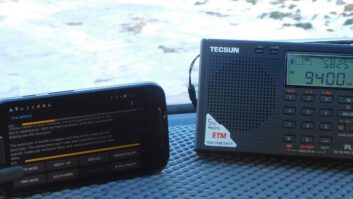
Like other forms of radio, U.S. overseas broadcasters must reach their audience on multiple platforms; increasingly, that means using delivery mechanisms other than shortwave.
The findings of a BBG report on the future of shortwave broadcasting for U.S. overseas broadcasting are key as shortwave transmission facilities continue to age, repairs are deemed expensive and the Broadcasting Board of Governors is trying to reduce what it considers to be unnecessary costs. The BBG oversees U.S. international broadcasters like Voice of America, Radio Free Europe/Radio Liberty and Radio Marti.
“While there is still a critical need for shortwave in key countries, it is a medium of marginal and continuously declining impact in most markets. Even in countries with currently significant levels of shortwave usage, audiences will migrate to other platforms as they become more accessible,” note the writers of a committee report on the future of shortwave, “To Be Where the Audience Is.”
The BBG has found no evidence that shortwave use increased during a crisis. In the report, the committee observes that audiences continue to use their existing platforms like FM, TV and the Internet “or seek out anti-censorship tools including online firewall circumvention, private chat software, flash drives and DVDs to access content.”
Digital shortwave, or Digital Radio Mondiale, is unlikely to become an established mass media distribution methodology in enough of the BBG’s current or future markets to justify the costs, notes the committee in the report.
Still, the report finds that substantial audiences embrace shortwave in Nigeria, Burma, North Korea, Afghanistan, Somalia, Zimbabwe, Cuba and other target markets for the BBG.
At the same time, the committee’s recommendations make clear that the BBG will need to continue to reduce or eliminate shortwave broadcasts where there is either minimal audience or that audience is not a U.S. foreign policy priority. The committee believes their findings back-up reductions that were made in redundant signals in 2013 and further cuts in transmissions that were made in 2014.
The BBG notes that even with these recent reductions, U.S. overseas broadcasters make programs in 35 of a total 61 broadcast languages available on shortwave where there is a strategic reason to do so. The shortwave committee report will be discussed at a public BBG meeting on Aug. 13.
Related:
CUSIB Pans Shortwave Report











